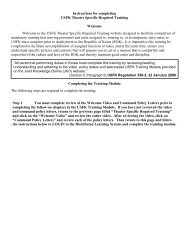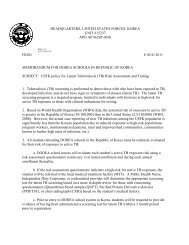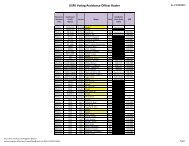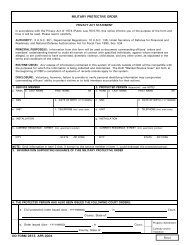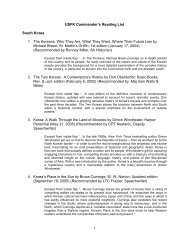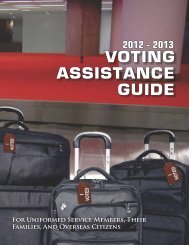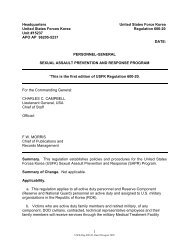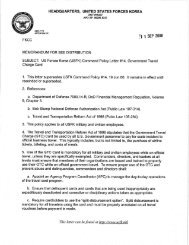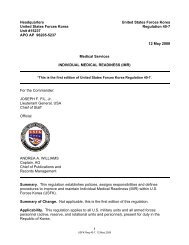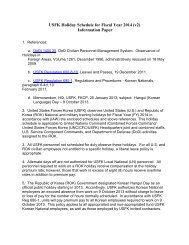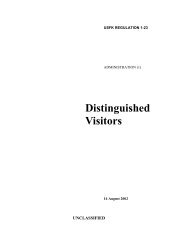Create successful ePaper yourself
Turn your PDF publications into a flip-book with our unique Google optimized e-Paper software.
Hangul, the <strong>Korea</strong>n alphabet, invented in the 15 th Century, is one of the many unique <strong>Korea</strong>n inventions.<br />
The phonetic alphabet, based on syllable groups, has only 14 consonants and 10 vowels. Today, <strong>Korea</strong><br />
has one of the highest literacy rates in the world, over 98%. Sometimes translations to English are imperfect<br />
since one <strong>Korea</strong>n consonant represents two English consonants : r/l, b/p, g/k, ch/j and d/t. In <strong>Korea</strong>n<br />
conversations, “yes” does not always constitute agreement. It simply means that your question has been heard<br />
and acknowledged. It is best to ask questions that cannot be answered with “yes” or “no.”<br />
Bowing is a traditional <strong>Korea</strong>n greeting, although men have adopted the custom of shaking hands. To<br />
show respect when shaking hands, support your right forearm with your left hand. Business cards should be<br />
exchanged with both hands, and the receiver should take a few moments to read the other person’s card. It is<br />
impolite to write on another person’s card or put it immediately in your pocket because the card is considered<br />
an extension of the person. It is acceptable for you to write more information on your own business card.<br />
It is appropriate to bring a gift when you visit someone’s home. The receiver usually politely refuses so as not<br />
to seem greedy and the giver must politely insist that they take the gift. Traditionally the gift is not unwrapped<br />
in front of the giver to avoid embarrassment on both sides if the gift is not liked. Sometimes the giver will<br />
follow the Western tradition and insist that the gift be opened immediately.<br />
<strong>Korea</strong>n names consist of a family name (one syllable) and given name (two<br />
syllables). The family name comes first. When they get married, women<br />
keep their family name, but children are usually given their father’s family<br />
name.<br />
<strong>Korea</strong>ns are considered one year old when they are born, so they will<br />
often differentiate “<strong>Korea</strong>n age” or “Western age” when asked. It is<br />
traditional to have a party for babies 100 days after they are born.<br />
In the past, if a child lived for 100 days their chances to survive<br />
until adulthood were good. Modern medicine has reduced<br />
the infant mortality rate, but the 100 day milestone is still<br />
celebrated with rice cakes and other delicacies.<br />
Personal relationships are important in the <strong>Korea</strong>n culture.<br />
Pleasantries are usually exchanged before business.<br />
Colleagues often eat dinner together and socialize after<br />
work. You are expected to remove your shoes when entering<br />
a person’s home, temples and in restaurants where you sit at<br />
low tables on raised floors.<br />
Soccer and baseball are in close competition for <strong>Korea</strong>’s number one team sport, and there are several<br />
popular individual sports. It is also possible to find running clubs, hockey leagues, rugby teams and<br />
other niche groups formed by international citizens and <strong>Korea</strong>ns with common interests.<br />
Baseball:<br />
Baseball is extremely popular, especially after the ROK team won gold in the 2008 Summer Olympics and<br />
came in second in the 2009 World Baseball Classic. There are currently eight teams in the <strong>Korea</strong>n Baseball<br />
Organization, established in 1982, that play throughout the season and in the post-season <strong>Korea</strong>n Series.<br />
Soccer:<br />
Soccer received a huge boost in popularity when the <strong>Korea</strong>n team came in fourth at the 2002 Federation<br />
Internationale de Football Association (FIFA) World Cup championships. The national soccer league has<br />
15 teams that play each other twice per season. The World Cup stadium in Seoul, which seats 64,000, was<br />
built for the 2002 FIFA games.<br />
Hiking & Skiing:<br />
Hiking is a staple in the Republic of <strong>Korea</strong>, where 70% of the land is mountainous. Even in the middle of<br />
Seoul there is Namsan Park, which has the famous Seoul Tower sitting on top. Plenty of hills means that<br />
there are plenty of places to ski. There are 12 major ski resorts in <strong>Korea</strong>, and most have the ability to make<br />
artificial snow. <strong>Korea</strong> hosted the World Cup Ski Competition in 1998 and the 1999 Winter Asian Games.<br />
Golf:<br />
Several of the ski resorts are co-located with golf courses so the resorts are open<br />
year round. Jeju-Do, an island south of the <strong>Korea</strong>n Peninsula, has quite a<br />
few golf courses. Jeju-Do is also a common honeymoon destination,<br />
famous for its beaches, snorkeling and scuba diving, its oranges, its<br />
warmer weather and Mount Halla, the extinct volcano that created<br />
the island.<br />
Taekwondo:<br />
Four million <strong>Korea</strong>ns practice taekwondo and it is taught to all<br />
<strong>Korea</strong>n military personnel. This martial art is popular among<br />
both men and women and concentrates on punching, kicking,<br />
blocking and self-discipline. Shouting while you practice is<br />
said to relieve stress and makes demonstrations impressive.<br />
Tipping is not expected at restaurants and can be viewed as<br />
an insult, implying that a tip is required for good service.<br />
Some restaurants add a ~15% service charge and tax to the<br />
listed price. If dining on a military installation, tip as you<br />
would in the United States.





